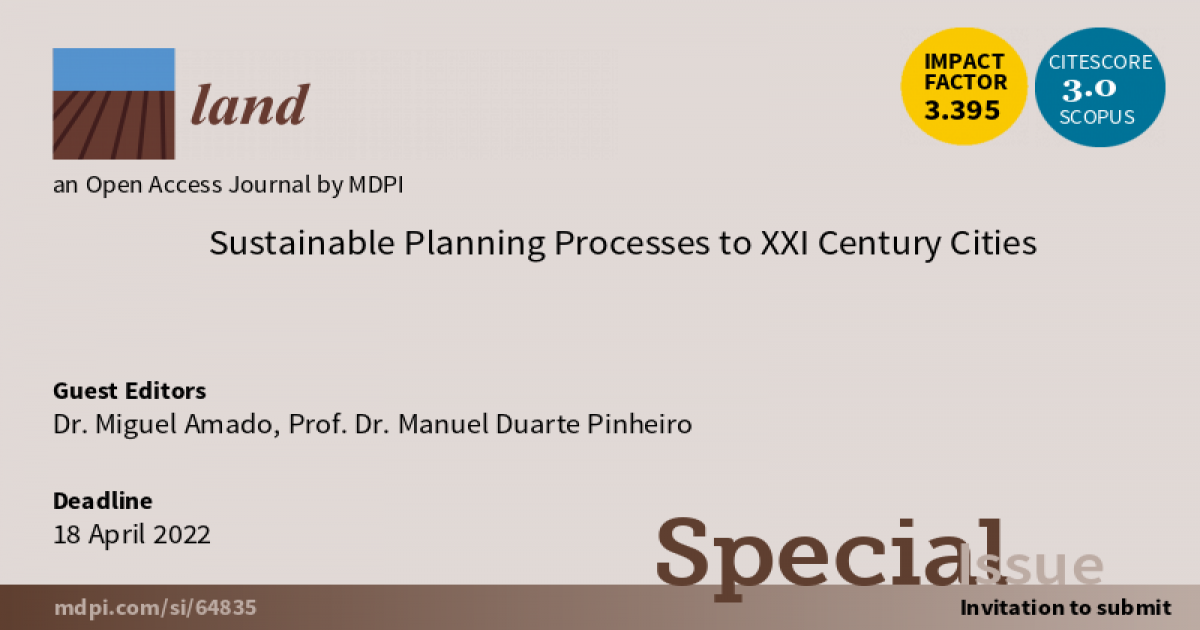Sustainable Planning Processes to XXI Century Cities
A special issue of Land (ISSN 2073-445X).
Deadline for manuscript submissions: closed (18 April 2022) | Viewed by 6059

Special Issue Editors
Interests: architecture; urban planning; sustainable development; energy efficience; smart cities; nature-based solutions
Special Issues, Collections and Topics in MDPI journals
Interests: sustainable construction; environmental impact; environmental management; sustainable tourism; sustainable management; lidera system
Special Issue Information
Dear Colleagues,
The urbanization process in developing countries is taking on an emergency character in the 21st century. More than 90 percent of growth and new urban areas occur in developing countries, and it is predicted that by 2040 the total of these areas built in developing countries will triple. The economic growth that the urbanization process brings has multifaceted effects and covers more space than the developing regions themselves. Among the different generated impacts, climate change is the one that provides the most advantages for the planet and the quality of life of the population as a whole.
Achieving sustainable development processes where cities, countries, and regions complement and develop, is the challenge to be pursued within the framework of the SDGs.
The construction of programs for sustainable city planning, sustainable development, and management of the city can, together, broaden the objectives and make it possible for different actions and activities to address the local, regional, national, and global scales.
This Special Issue will contribute to the discussion on intervention models applicable to cities as a dynamic vector and management solutions for urban expansion areas to achieve a more inclusive society and without the risk of worsening the phenomena of poverty or effects of unanticipated consequences in decision-making processes.
Prof. Dr. Miguel Amado
Prof. Dr. Manuel Duarte Pinheiro
Guest Editors
Manuscript Submission Information
Manuscripts should be submitted online at www.mdpi.com by registering and logging in to this website. Once you are registered, click here to go to the submission form. Manuscripts can be submitted until the deadline. All submissions that pass pre-check are peer-reviewed. Accepted papers will be published continuously in the journal (as soon as accepted) and will be listed together on the special issue website. Research articles, review articles as well as short communications are invited. For planned papers, a title and short abstract (about 100 words) can be sent to the Editorial Office for announcement on this website.
Submitted manuscripts should not have been published previously, nor be under consideration for publication elsewhere (except conference proceedings papers). All manuscripts are thoroughly refereed through a single-blind peer-review process. A guide for authors and other relevant information for submission of manuscripts is available on the Instructions for Authors page. Land is an international peer-reviewed open access monthly journal published by MDPI.
Please visit the Instructions for Authors page before submitting a manuscript. The Article Processing Charge (APC) for publication in this open access journal is 2600 CHF (Swiss Francs). Submitted papers should be well formatted and use good English. Authors may use MDPI's English editing service prior to publication or during author revisions.
Keywords
- sustainable land-use management
- land system management
- transition towards
- sustainability in cities
- developing countries
- climate change






